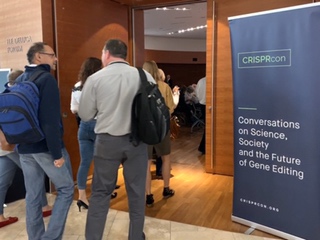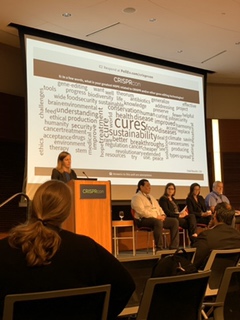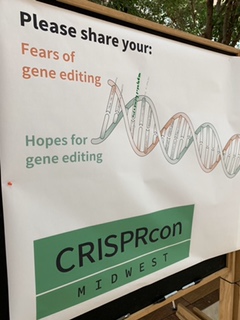
Last week, a diverse group of stakeholders attended CRISPRcon Midwest, hosted by the Keystone Policy Center and the University of Wisconsin–Madison. The goal of the day-long conference was to emphasize the importance and value of gene editing technology, and how it must be communicated deliberately between scientists, the public, policymakers, and other stakeholders.
Julie Shapiro, Senior Policy Director of Keystone Policy Center, acted as Emcee for the event. Given the diverse group of attendees, she mentioned in her opening remarks that the event organizers were “seeking conversation, not consensus” and emphasized the “power of respectful dialogue.” A slide overhead showcased the ground rules for the day, which included statements such as “dare to listen, dare to share, and dare to disagree.”

CRISPRcon aimed to included voices beyond those represented by keynote speakers and panelists, so they incorporated live polling through an online app to keep the audience engaged and an active participant in the conversations throughout the day. From the opening remarks, it was clear that this conference would not just deliver on its promise of thoughtful conversation about the science, but build further understanding about the societal impacts of a rapidly advancing technology.
The first panel, “What’s at Stake? The Promise and Perils of Gene Editing,” began with Joseph MV Yracheta, Senior Scientist at the Native Bio-Data Consortium and Graduate Student at Johns Hopkins Bloomberg School of Public Health, delivering a moving prayer in his native Sioux language, emphasizing the importance of acknowledging indigenous perspectives in the conversations that would follow throughout the day.
CRISPR is a gene editing tool that can benefit many advancing scientific areas—from treatment of rare genetic disorders, to conservation efforts, to agricultural applications. However, bioethical conversations surrounding use of the technology are foundational to the future of society.
One takeaway that resonated throughout the day was nicely summarized by Craig Hassel, Associate Professor and Extension Nutritionist at University of Minnesota. Professor Hassel said that when discussing such a nuanced and potentially controversial topic, “context really matters.”
During the “Conversation on CRISPR Science and Communications” Keynote, the speakers concluded that the conversations are often less about the science, and more about the pressing societal questions such as “can I afford this treatment?” Therefore, it’s important to not overhype/overpromise, and the public must stay engaged and informed. Dietram Scheufele, Science Communication Chair and Professor at UW–Madison, emphasizes that even though CRISPR and gene editing technology is moving fast, there is value in taking the time to have these discussions because “once we’re there, it’s too late.”
The most lively discussion occurred during the “Gene Editing, Human Health, and Genetic Variability” Panel, where a diverse group of panelists debated the decision making needed when considering germline gene editing (which passes down edited DNA to descendants) versus somatic gene editing (a therapy that only affects the person receiving it). How can you make that decision that might affect your future children/grandchildren? There are lots of factors to weigh, and it requires a balance between rational understanding and raw emotions.
James Griffin, author of Breaking Silence: Living with Sickle Cell Anemia, shared his story as a sickle cell warrior, and Brad Swail, founder of the Deletion Duplication Alliance, got choked up talking as a parent of a child with a rare genetic disease. It’s easy to get caught up in the science, but we should always remember the impact it has on personal lives.
Keynote speaker Chuck Klosterman presented several “thought experiments” during his talk titled, “Science and Society—But What if We’re Wrong?” He reasoned that the history of ideas is the history of being wrong. “Think of the present as being in the past…our understanding of science, society, reality and all of these things is simply a layering of blocks of wrongness on top of each other, with the top block sometimes being the truth.”
He suggested that with most controversial topics, people don’t like to build wrongness into their arguments—but maybe we should. “Do you self-identify as being in a field that is controversial?” he asked the audience. Stakeholders in gene editing technology are invested in changing the world. “How do you feel about that? How much does what others think dictate what you will do?”
In the “Gene Editing, Agriculture and Sustainability” Panel, it was again reinforced that the conversations surrounding gene editing elevate beyond just the science. Farming and agriculture practices vary greatly across states, countries, and around the world. Jim Goodman, Board President of the National Family Farm Coalition said that “we can’t coexist until everyone is cared for equally.”

The live polling being done throughout the conference wasn’t just a gimmick. Dominique Brossard, Professor and Chair of the Department of Life Sciences Communication at UW-Madison compared the data collected from the live polls with surveyed public attitudes about gene editing. Overall, CRISPRcon attendees had an attitude of acceptance of gene editing technologies, while the public data showed more hesitance and skepticism. But the most significant finding was that everyone desires more public engagement and equity in the conversations about this topic.
The conference concluded with a panel titled, “Who Owns Gene Editing?” After all, how can you patent something that is a naturally occurring cellular process? Panelists clarified that patents on research tools must include some element not found in nature. Beth Werner, Intellectual Property Manager at Wisconsin Alumni Research Foundation, challenged the audience to consider “does a patent help or hinder getting this into the marketplace?” It’s also important to consider questions surrounding how research tools are managed, by balancing access and associated risks. Especially if research tools are federally funded, there must be conversation and consideration to make it broadly available. But what impact does that have for institutional science, when there are YouTubers doing gene editing experiments in their garage?
CRISPRcon Midwest was a successful forum for these societal questions, and conversations need to continue as the technology continues to advance. Event hosts, moderators, speakers, panelists, and attendees demonstrated the great ability to discuss a complex topic with nuance. It’s clear that open, deliberate, respectful, and engaging dialogue will help build trust between all community voices and set the foundation for future research discoveries.
Promega was a sponsor of CRISPRcon Midwest. Learn more about how Promega is using CRISPR technologies to study endogenous protein dynamics in this webinar.
Latest posts by Mariel Mohns (see all)
- Sustainability Makeover: Parking Ramp Edition - January 27, 2020
- Go with Your Gut: Understanding How the Microbiome and Diet Influence Health - November 26, 2019
- Celebrating and Supporting Women in STEM for Science-a-thon - October 25, 2019
